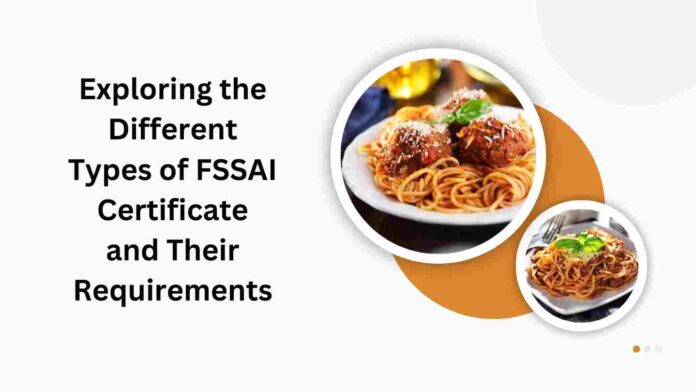The Food Safety and Standards Authority of India (FSSAI) offers various types of certificates to food businesses, each tailored to specific categories and activities within the food industry. Understanding the different types of FSSAI Certificate and their respective requirements is crucial for businesses to ensure compliance and operate legally. This exploration aims to shed light on the various types of FSSAI Certificate and the criteria for obtaining them.
Types of FSSAI Certificate:
FSSAI Registration:
This certificate is applicable to small-scale food businesses with an annual turnover of up to ₹12 lakhs. It is a basic registration required for activities such as petty retailers, hawkers, and small-scale manufacturers, processors, and transporters.
State FSSAI License:
Suitable for medium-sized food businesses operating within a single state, this license is mandatory for businesses with an annual turnover between ₹12 lakhs and ₹20 crores. It covers activities such as manufacturing, processing, storage, distribution, and sale of food products within the state.
Central FSSAI License:
Designed for large-scale food businesses operating across multiple states or engaged in import-export activities, this license is mandatory for businesses with an annual turnover exceeding ₹20 crores. It applies to manufacturers, importers, exporters, distributors, and operators of food-related businesses at the national level.
Requirements for Obtaining FSSAI Certificate:
Business Registration:
Food businesses must be legally registered under relevant laws, such as the Companies Act, Partnership Act, or Cooperative Society Act, depending on their business structure.
Premises and Infrastructure:
The premises where food-related activities are conducted must comply with hygiene and safety standards prescribed by FSSAI. This includes adequate facilities for storage, processing, sanitation, and waste disposal.
Food Safety Management System:
Businesses are required to implement a food safety management system based on Hazard Analysis and Critical Control Points (HACCP) principles to ensure the safety and quality of food products.
Documentation:
Applicants need to submit various documents, including proof of identity, address, business registration, layout plan of premises, food safety management plan, and other relevant certificates and permits.
Product Classification:
Depending on the nature of the food products handled by the business, specific requirements may apply. For instance, businesses dealing with perishable items, dairy products, meat, or packaged foods may have additional criteria to meet for FSSAI certification.
Quality Control Measures:
FSSAI Certificate also necessitate the implementation of robust quality control measures throughout the production, processing, and distribution chain. This includes regular testing of raw materials, finished products, and environmental samples to ensure compliance with microbiological, chemical, and physical standards.
Training and Personnel Hygiene:
Businesses are required to train their staff on food safety practices, hygiene standards, and compliance requirements. Personnel involved in food handling, storage, and processing must adhere to strict hygiene practices to prevent contamination and ensure food safety.
Labeling and Packaging Compliance:
FSSAI regulations mandate proper labeling and packaging of food products to provide consumers with accurate information regarding ingredients, nutritional content, allergens, and expiry dates. Businesses must ensure that their packaging materials meet FSSAI standards and include all mandatory labeling requirements.
Renewal and Maintenance:
FSSAI Certificate are typically valid for a specified period, after which they need to be renewed to ensure ongoing compliance. Businesses must maintain records, conduct internal audits, and undergo periodic inspections to demonstrate continued adherence to FSSAI regulations.
Note: You can read Importance of FSSAI Certificate for Food Businesses
Specialized Certifications:
In addition to the standard FSSAI Certificate, certain businesses may require specialized certifications based on their niche or specific requirements. For example, organic food producers may need certification from agencies accredited by FSSAI to label their products as organic.
Conclusion:
The diverse range of FSSAI Certificate available caters to the varied needs and complexities of the food industry. Ensuring that businesses of all sizes and types can comply with regulatory standards. By meeting the requirements outlined by FSSAI for each certificate type, food businesses can not only demonstrate their commitment to food safety but also gain credibility, trust, and market acceptance. Businesses need to stay informed about the latest updates and changes in FSSAI regulations to adapt their practices accordingly and maintain compliance. Ultimately, FSSAI certification is not just a legal obligation but also a testament to a business’s dedication to providing safe, high-quality food products to consumers while upholding the highest standards of integrity and professionalism in the food industry.


